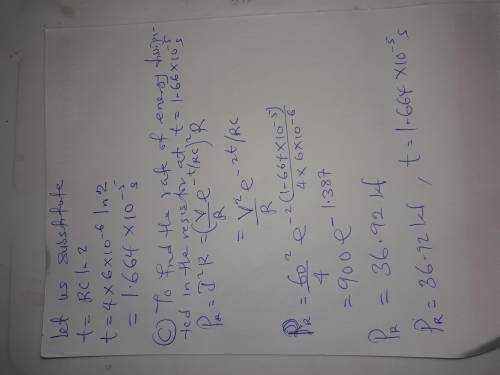
Physics, 10.03.2020 09:10 tayjohn9774
A 6.00 μFμF capacitor that is initially uncharged is connected in series with a 4.00 ΩΩ resistor and an emf source with EE EMF = 60.0 V and negligible internal resistance. The circuit is completed at t = 0. (a) Just after the circuit is completed, what is the rate at which electrical energy is being dissipated in the resistor? (b) At what value of t is the rate at which electrical energy is being dissipated in the resistor equal to the rate at which electrical energy is being stored in the capacitor? (c) At the time calculated in part (b), what is the rate at which electrical energy is being dissipated in the resistor?

Answers: 2


Another question on Physics

Physics, 21.06.2019 23:10
6–55 refrigerant-134a enters the condenser of a residential heat pump at 800 kpa and 358c at a rate of 0.018 kg/s and leaves at 800 kpa as a saturated liquid. if the compressor consumes 1.2 kw of power, determine (a) the cop of the heat pump and (b) the rate of heat absorption from the outside air.
Answers: 2

Physics, 22.06.2019 00:30
Glass is transparent to visibile light under normal conditions; however, at extremely high intensities, glass will absorb most of the light incident upon it. this works through a process known as multiphoton absorption. in this process, several photons are absorbed at the same time. if very intense light whose photons carry 2ev of energy is shined onto a material with a band gap of 4ev, that light can be absorbed through two-photon absorption, because two photons have the right amount of energy to bridge the band gap. what is the minimum number of photons of 800-nm light that are needed to equal or exceed the band gap of fused silica glass
Answers: 1

Physics, 22.06.2019 13:30
The period of a pendulum varies directly as the square root of the length of the pendulum and inversely as the square root of the acceleration due to gravity. find the period when the length is 144 cm and the acceleration due to gravity is 980 cm per second squared, if the period is 7pi seconds when the length is 289 cm and the acceleration due to gravity is 980 cm per second squared.
Answers: 2

Physics, 22.06.2019 15:20
Your science teacher brings in a speaker to talk to your class about climate change. during the session, students ask a few questions. which questions are related to the current evidence on climate change
Answers: 3
You know the right answer?
A 6.00 μFμF capacitor that is initially uncharged is connected in series with a 4.00 ΩΩ resistor and...
Questions

Mathematics, 17.07.2019 08:30

English, 17.07.2019 08:30


Mathematics, 17.07.2019 08:30

Physics, 17.07.2019 08:30

English, 17.07.2019 08:30

Chemistry, 17.07.2019 08:30

Mathematics, 17.07.2019 08:30


Mathematics, 17.07.2019 08:30



Physics, 17.07.2019 08:30

Mathematics, 17.07.2019 08:30


Geography, 17.07.2019 08:30

History, 17.07.2019 08:30







